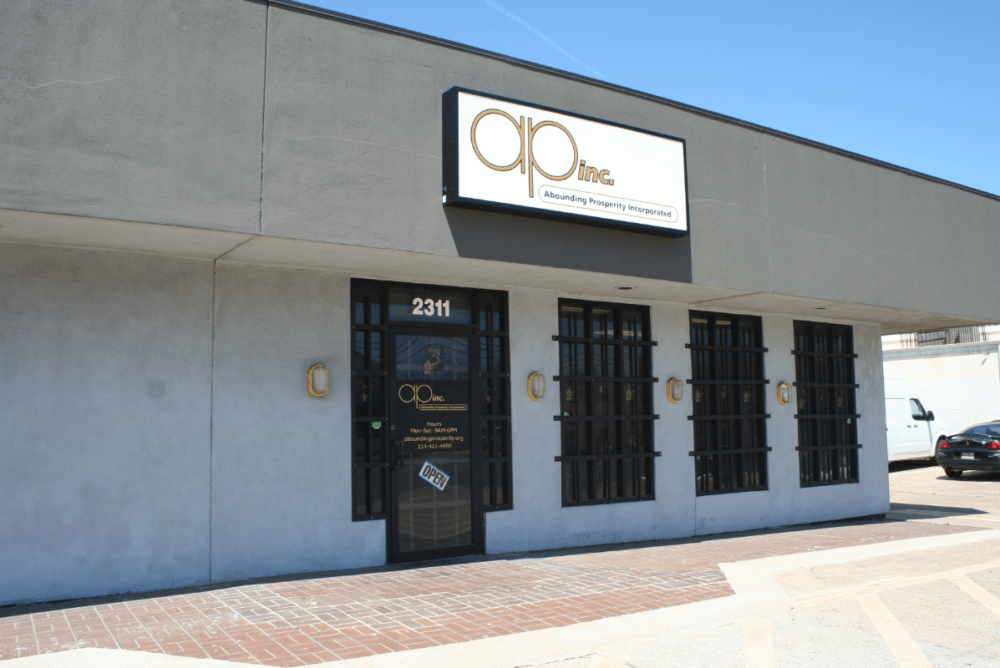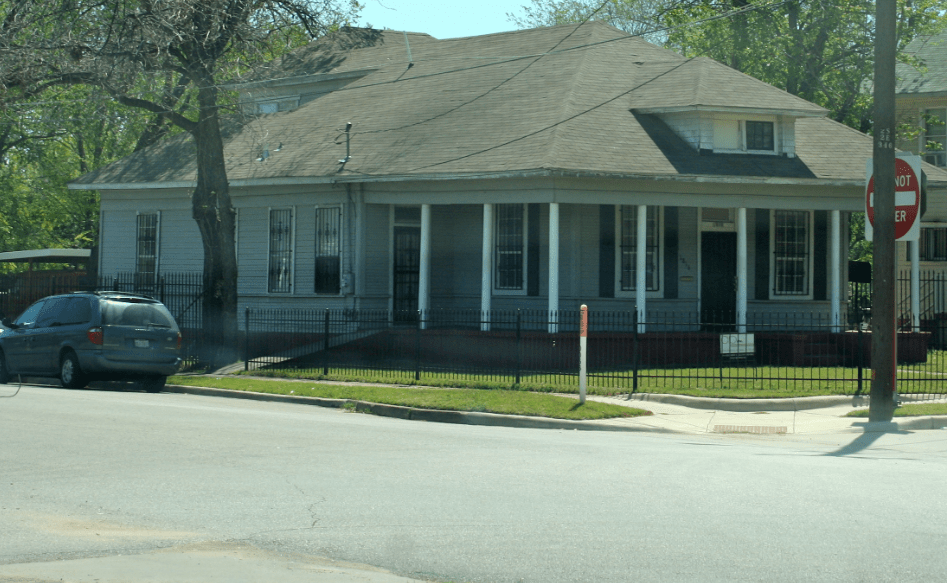
Pocahontas Duvall, a member of Abounding Prosperity’s outreach team, sits and works at the front desk. (Emily Sims)
When asked what Abounding Prosperity means to him, Pierre Flowers responds without hesitation. To him it means saving lives. Flowers, who started working in the HIV outreach field in 2004, became an employee in August 2012. He is one of 10 employees of the nonprofit organization who share a mutual passion for its mission.
“Saving lives, that’s all we do is try to save lives one client at a time,” said Flowers. “We give people a discreet and confidential safe spot to share their information, to test and know their status.”
The organization, which already has two locations in South Dallas, is planning on opening a third in Pleasant Grove in April 2013. In addition to offering HIV screenings, the new location will also offer GED classes for those in the area who might not have finished high school. Although different donors fund the organization’s other programs, the GED program is being funding by the organization itself.
“We’ve decided as an organization we aren’t going to wait for the money,” said Dr. Latrese Adkins, AP’s interim program data manager. “We do for the people what they need and we just hope and pray that we will find the money.”
Adkins, who has past teaching experience in Dallas Independent School District, will be teaching the courses herself, while the books and course materials have been donated by DISD.
Abounding Prosperity CEO and President Kirk Myers founded the organization in 2005. Myers, a black gay man himself, saw how HIV was devastating other black gay men. He wanted to start a Dallas-based organization that focused on servicing the needs of that population while helping prevent them from contracting HIV.
‘For us by us’ is what Kirk says,” said Adkins. “What he wanted to see happen was an organization by black gay men on behalf of black gay men.”
The organization’s other programs are designated for the specific target population that each of its donors chooses to serve. Both the Center of Disease Control and Prevention (CDC) and the Texas Department of State Health and Human Services fund HIV prevention programs for African American men who sleep with men (MSM).
A $1.7 million grant from the CDC funds condom distribution and HIV testing among young African American MSM while funding from the Texas Department of Health and Human Services funds the same things among African American MSM age 30 and older.
Abounding Prosperity also receives funding from the South Dallas Fair Park Trust Fund, which aims to prevent HIV and promote HIV education among sex workers and those who live in the 75215 and 75210 zip codes of Dallas. These funds allow the organization to offer free HIV testing to anyone living in the 75215 and 75210 zip codes.
Abounding Prosperity offers HIV testing at both the Martin Luther King location, which is its corporate office, and its empowerment center located on Peabody Street, which is its original location.
At the empowerment center, the organization holds monthly support groups for transgender women, gay or bisexual men, and men recovering from drug abuse.
“It serves as a safe space where people can meet and talk about their issues with no fear of being judged and no fear of being made to feel uncomfortable for whatever their issue may be,” said Adkins.
The empowerment center also hosts weekend-long retreats as a part of its Many Men Many Voices program, which is funded by the CDC grant. The organization invites between 10-12 young black MSM who are HIV negative but at a high risk of contracting the virus on the retreats. The men spend the weekend in a mode of self-reflection. They engage in role-play, problem solving, and critical thinking so that they can learn how to be in control of their sexual health.
“They really critique their own behaviors and romantic and sexual needs and they analyze those behaviors that put them at risk for contracting the virus,” said Adkins.
Although Abounding Prosperity offers testing at its offices, it sends out a team of its employees into the community to test its target population.
“Our goal is to identify people who are positive and get them in care,” said Adkins. “We also spend a lot of energy and effort making sure that condoms are available to those young MSM.”
The team, which they called the out reach team, consists of a skilled and trained staff that all vary in their sexual orientation. Flowers, a heterosexual, is a part of the staff. However, the staff also has gay, lesbian, and transgender members.
“The outreach team is really the vanguard of the organization,” said Adkins. “They give leg and feet to the actual mission of abounding prosperity.”
The staff goes out Thursday through Sunday into areas where their target population hangs out or socializes. Areas typically include South Dallas and Cedar Springs. They go into red-light districts and hand out condoms to sex workers. They go into gay clubs or bars and offer HIV screenings.
Kent McArthur is a facilitative recruitment specialist at Abounding Prosperity and is also apart of the outreach team. In addition to going to gay clubs and bars, the staff also goes to train stations and parole offices to offer testing. They approach potential clients and ask them a few questions before they offering the testing.
“Do they come here often? How old are you? Since we have a target population, we have to do an initial screening, ” said McArthur. “Once they qualify, we give them a condom package and tell them about the organization and if they are willing we take them to a designated area and give them a test.”
Condom packages consist of two condoms, lubrication, and literature about safe sex and HIV prevention. The organization’s volunteers assemble these packages.
The team uses an oral swab HIV test, making it possible to test on location. After the test, the team gives the client a risk reduction assessment, which is advice on how to stay negative. However if they are positive, the team does what they can to link them to care.
According to McArthur, most people they talk to aren’t willing to get tested. But the team believes that black MSM are more likely to get tested by Abounding Prosperity than at a health center.
“You are going to be more comfortable with people who look like you,” said McArthur. Another factor that brings clients in is the lack of health care. “They aren’t going to go to the health department. They aren’t going to pay and they don’t have a doctor,” said Flowers.
In 2011, the organization tested 600 people and had a 10 percent positivity rate. In addition to HIV prevention, Myers’ concern expands further than that.
“Kirk’s goal is to ensure the eradication of the disease and the health of the black family,” said Adkins. “And so for black families to be healthy, black women have to be healthy, black men have to be healthy, and black boys and girls have to be healthy.”

Abounding Prosperity’s corporate office is the organizations second location and is on Martin Luther King Jr Blvd. in South Dallas. (Emily Sims)

The organization’s Peabody Street location is used as an empowerment center. (Emily Sims)

(Courtesy of the CDC.)









